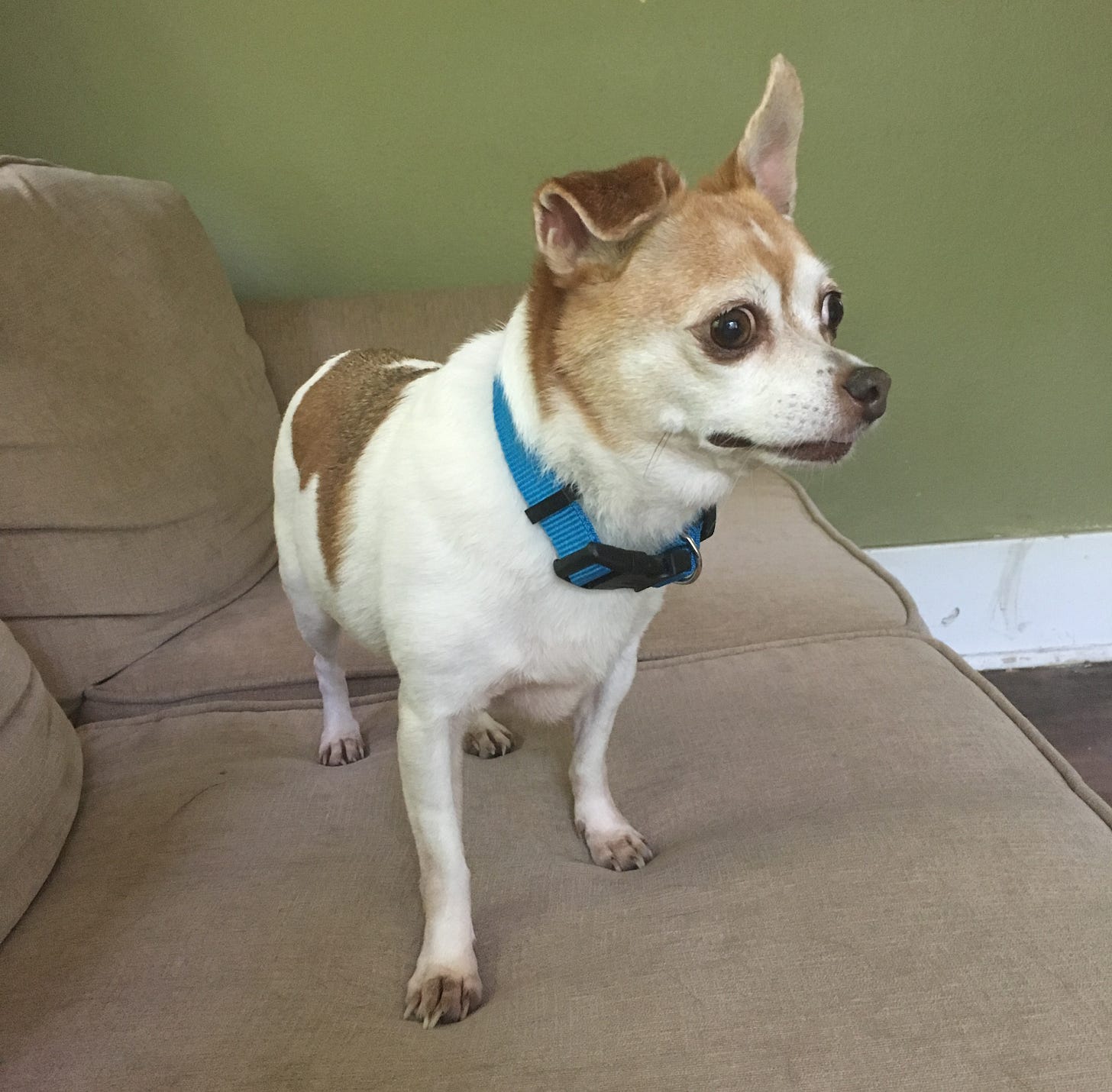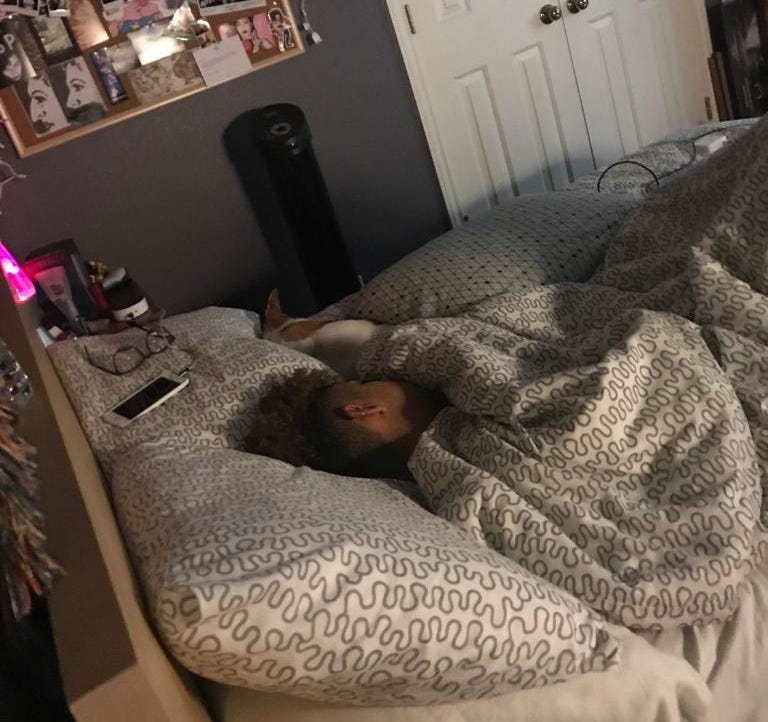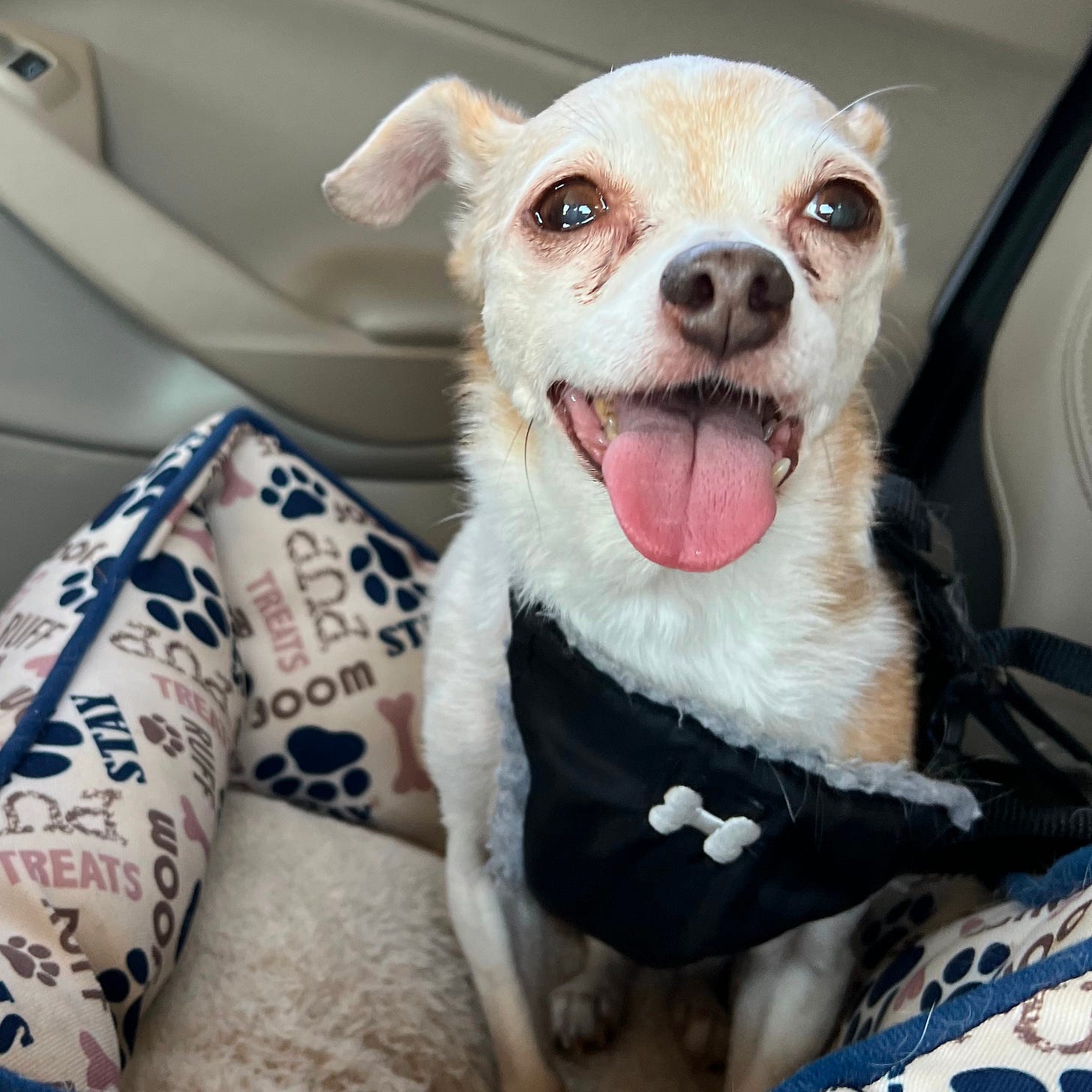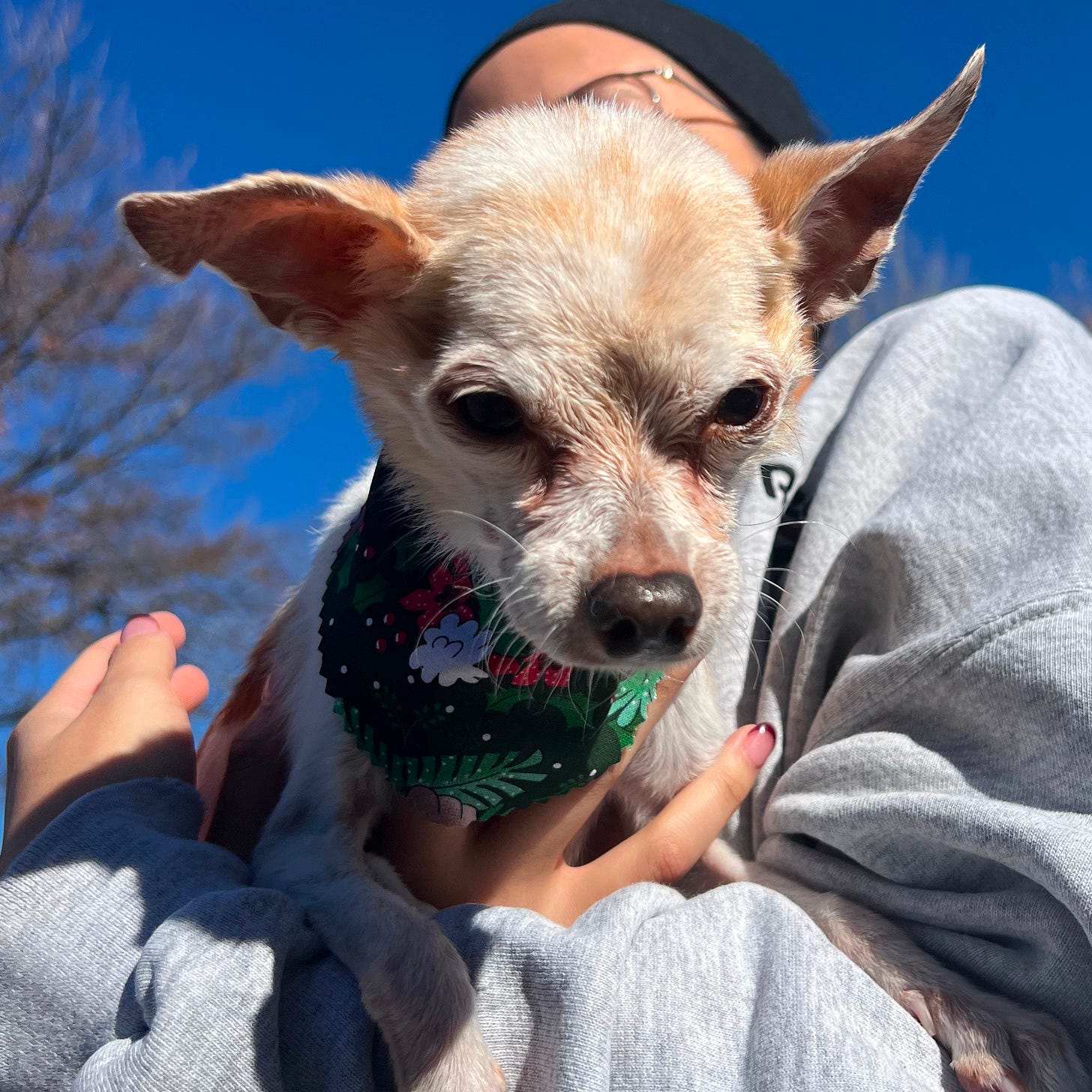I'm Glad My Dog Died
A rumination on pet euthanasia and grief
I began grieving my dog the moment I met her.
It comes with the territory of adopting a senior dog. Mortality, as hard as you try to delegate it to the background, looms over everything. You know your time together will be brief. You know saying goodbye will be excruciating. You know the specter of death is biding its time in the shadows until it emerges to strike.
That’s probably part of the reason why senior dogs have such difficulty getting adopted. (According to the ASPCA, seniors have an adoption rate of 25%, while their younger counterparts have better odds at 60%.) Who in their right mind would voluntarily sign up for such sorrow? Me, that’s who. I have always had a soft spot for those cast aside and deemed unlovable, or difficult to love; I firmly believe we are all deserving of love. Dogs especially more.
Missy was 11 years old when she came into my life.
It was July 2018 and I was coming off my freshman year of college. I was taking some summer classes to stay on track for early graduation, and I was working extra shifts at the local NBC affiliate to gain residency to qualify for in-state tuition as I planned to study abroad the next summer and my scholarship only applied to the fall and spring semesters. (I later learned that my mom had claimed me as a dependent in her tax forms, completely nullifying this attempt at lowering my education costs.)
The loneliness was unbearable. I had some friends who were also staying in town, which very much helped, but it was my first summer away from my family and I missed them dearly. Latinos are so close-knit and place such an emphasis on family, probably to the point where it’s toxic, but that’s for another post.
I felt very lost and confused as one does when they’re growing into their own and first learning to become independent. Did I make the right choices? Am I cut out for journalism? Should I have gone home for the summer? Who am I without my family? How do I survive on my lonesome? Do I like myself? Do I like who I’m becoming?
These questions — along with several others I don’t feel like getting into — rattled in my head almost constantly like a cacophony of self-doubt.
I found a brief respite one weekend when I was visiting a recently graduated friend and her family outside of St. Louis. They had an incredibly sweet big dog with black fur, whose name and breed escape me now. At night, she would come up to the bed in the guest room where I was staying and let me pet her until returning to her resting place. It was a tender, healing action for me, given how alone I felt. Dogs know when we need our spirits lifted.
I’ve loved animals, and especially dogs since I was a child. How lucky are we that we get to share this planet with so many different species? They are the true aliens that walk among us, and they interest me far more than the so-called extraterrestrials from wild tales about probes and abductions.
My childhood dog, Odie, was a rambunctious little creature. Unfortunately, my parents weren’t well-equipped to take care of him. When they were growing up in Colombia, dogs weren’t treated as part of the family. They were viewed as animals first and foremost. Dogs would roam the streets and eat anything and everything they could find. There wasn’t much care put into them besides making sure they were fed and watered. As a result, my parents never trained Odie, and with him being a Jack Russell Terrier, he resorted to his most basic, animalistic tendencies. He would bark incessantly, pee and poop all over the place, and bite — hard — without warning.
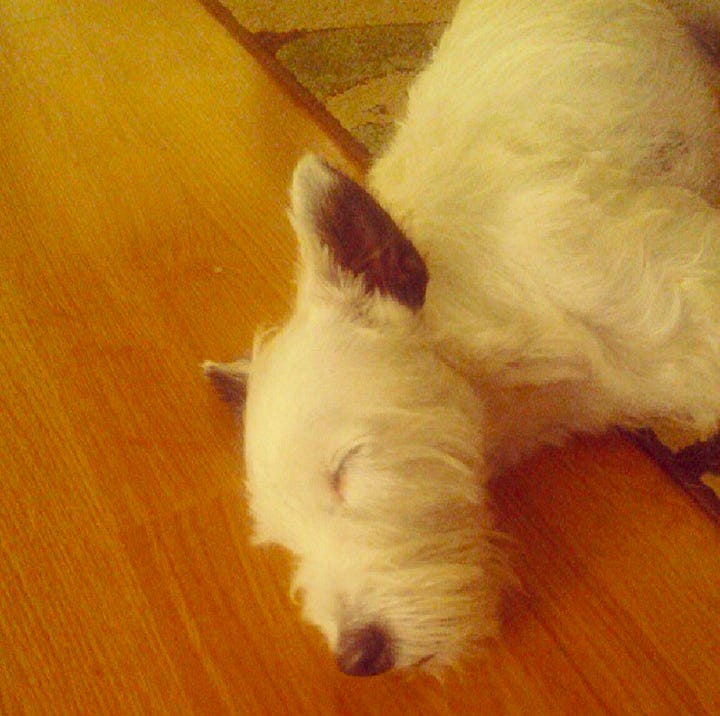
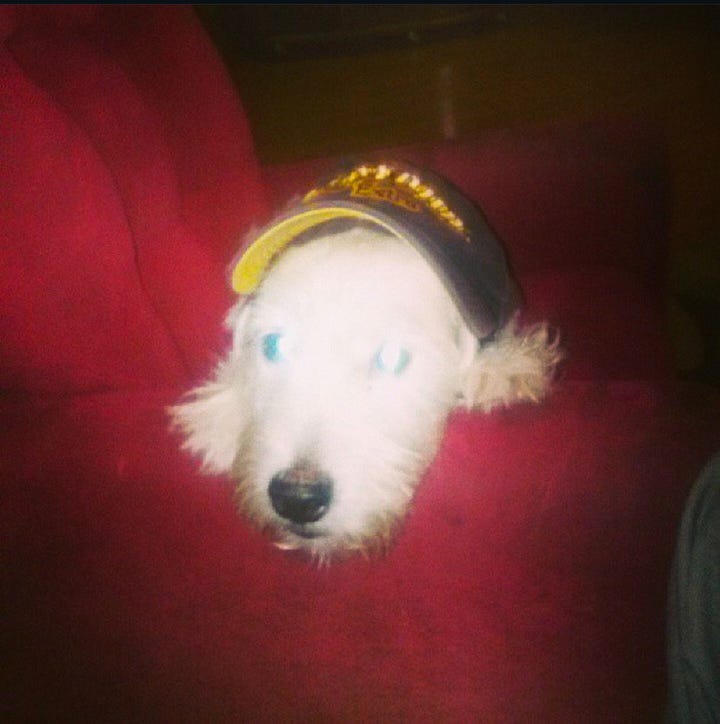
Odie had some sweet moments of domestication, but they were few and far between. It was ultimately like living with a wild animal. Most of the time, I was scared to approach him out of fear of being bit, as it had happened more than once. When my parents separated, I felt a slight relief that he would be staying with my dad. I didn’t want to be responsible for him or deal with his aggressive behavior any longer. At some point when I was in high school, my dad rehomed Odie without telling me or my sister. I have no idea where he ended up, or if he’s even still alive.
My experience with Odie informed my view on dog ownership for a long time. It wasn’t until I was older and had friends with pets that I saw how well-behaved dogs could be, and what responsible caretaking looked like.
I left St. Louis after that weekend with dog on the brain. I accepted a dogsitting job from an older couple who had a feisty Scottish Terrier, and it got me thinking: Maybe a dog would solve all of my problems. Maybe it wouldn’t. But it couldn’t hurt, right? So I became resolute in my intention to adopt, despite protestations from my friends and family. Owning a dog is expensive, and you’re a student, they said. It’s not fair to the dog when you’re busy in class. It’s a long commitment if you find a younger dog, and why would you go with an older one since they’ll die so soon?
They were all valid concerns. But I am stubborn, hard-nosed, and do not like being told I cannot do something, so I was determined to make it work. I began perusing the local humane society’s website, eyeing the dogs up for adoption, when a trio of chihuahuas caught my attention. Because they were older, the shelter had waived their fees, essentially making them free to adopt.
Upon watching Beverly Hills Chihuahua at the age of nine, I developed an affinity for the yappy little breed. I think they’re the cutest dogs ever, and I always wanted one.
Of the three chihuahuas, I felt an instant kinship with Missy. Her goofy grin, one floppy ear, and big bug eyes beckoned me. I felt in my bones that this was the dog for me. I called the shelter to express my interest almost immediately and we set up an appointment for later that same day so I could meet her and confirm I wanted to go through with the adoption. It was a formality, really. I knew I was going to go home with this dog.
Once at the shelter, I learned that this little dog, born on Aug. 14, 2007, had somehow made it to Columbia, Missouri, all the way from Denver, Colorado. Her owners had given her up, along with two of her siblings, because they didn’t have the time to care for them anymore. Cinnamon had already been adopted, so only Missy and Sparky remained. Although it broke my heart to separate them, I knew I couldn’t handle more than one dog. (Sparky’s profile disappeared from the website a few weeks later, so I assume he got adopted, too.)
Missy was a timid little thing at first. When I stepped into her teeny enclosure at the shelter, she was justifiably terrified of me. She backed into the corner, flanked by Sparky on her left, shaking. After multiple attempts at trying to get her to approach me, she finally acquiesced and let me pet her. It wasn’t until after we left the shelter that she let her true personality shine through.
Despite being 11 years old, she was a bundle of energy. Fitted with a bright blue collar from the shelter that was slightly too big for her, she zoomed around the house I was living in at the time, eager to explore her new surroundings.
I didn’t sleep at all the first night. Missy kept whining and refused to sleep on the bed I bought her. I was worried there was something wrong with her, until I lifted her onto my bed and she fell asleep shortly after. She slept by my side every night for nearly a year after that. Her cute snores helped mitigate my insomnia and lulled me to sleep.
Missy was not a cure-all for my loneliness or mental health struggles; I don’t think such a thing exists. But she certainly helped. She was there for me at my lowest moments, providing companionship when I desperately needed it. I don’t know how I would’ve survived that summer, and my sophomore year, without her. She taught me how to be more responsible. I partied less because I had to take care of her, which ultimately boosted my well-being. Of course, there were moments when I slipped up and could’ve taken better care of her, but she never suffered or went without food or water. She loved me, and I loved her. Whenever I would come home from class or work, she would be there waiting for me, so excited to see me, zooming back and forth across my room until tiring herself out. Given her advanced age, I remember thinking to myself and telling friends how devastated I would be when she died. But that still seemed so far off, and I pushed the thought to the back of my mind.
We were inseparable. She accompanied me numerous times on the nine-hour drive from Missouri and Texas. We developed a little tradition, stopping at the same gas station in Joplin right before powering through the Oklahoma leg of our journey, because it had a large patch of grass with plenty of room for her to stretch her legs and go about her business. She grew accustomed to the ritual; she would sleep for the first half of the drive, and then wake up when we were just shy of arriving in Joplin, getting antsier and antsier the closer we got.
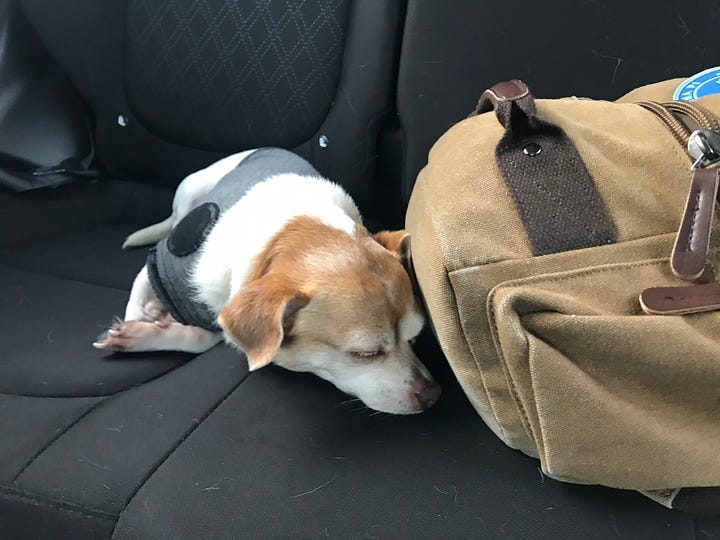
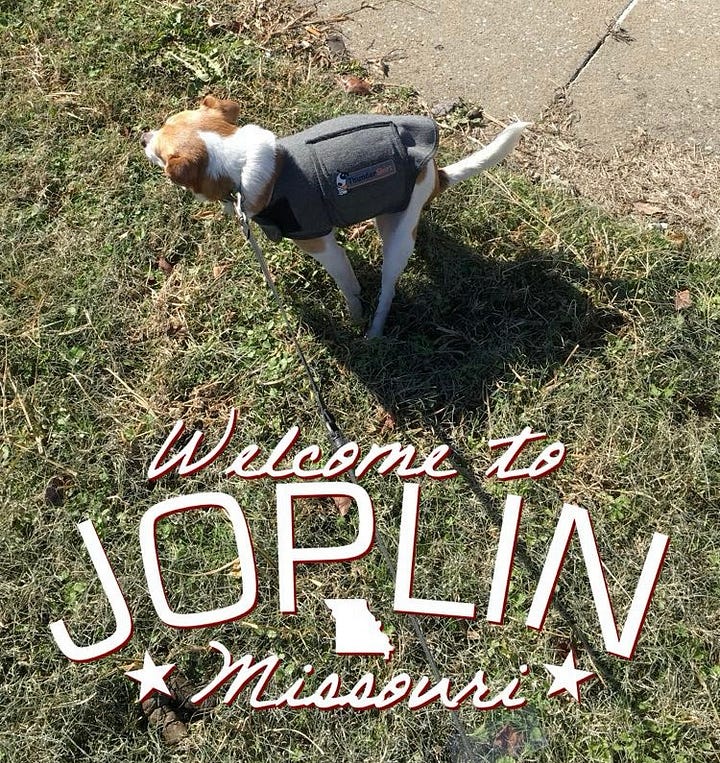
In the summer of 2019, I made the hard decision to permanently keep Missy with my mom in Texas. I was going to study abroad in Brussels and had no one else to take care of her. And when I would return from Europe, I would be starting the more intensive part of my degree, having to spend long hours at the NBC station and driving around mid-Missouri finding stories to report on. I thought it best for Missy, and my mom: She had recently bought a house with a big backyard and was soon to be an empty nester with my sister going off to college. I figured the two could keep each other company.
Despite some initial resistance from my mom, my hunch proved right. They became attached at the hip. She babied her like a third child. Missy got a bed in my mom’s room, and they slept a few feet apart every night. My mom would send me pictures every day. I would send money when I could to pay for her expenses. I relished the opportunity to go back home during breaks to see Missy. But during this period, we began to grow apart. With my mom now acting as her primary caregiver, she didn’t give me as much attention as she used to. She didn’t want to sleep in my bed anymore. Although it saddened me at the beginning, I was just happy to still have her in my life. Moving to New York in 2020 only further deepened this divide, although I was still able to see her for extended periods around Christmas and in the summer.
The first signs of trouble began in 2023. Missy had long suffered from patellar luxation, and medication had kept it in check, but it was getting worse. She could no longer climb up and down the stairs, but she was still active, and would occasionally get the zoomies.
Around this time, the prospect of her death had begun to sink in for me. She was 16 and her knees wouldn’t be getting any younger. To me, it felt like the first time she was truly showing her age. When I would visit, I sometimes struggled to live in the moment with her. Many times I would lay on the floor beside her bed at night, silently crying as I thought about what her death would be like for me. It felt like my world was ending. I acted as if every time I saw her was the last.
Still, she marched on and made it to 2024, but her deterioration only became even more apparent. She was walking less and less and falling more and more. She wasn’t eating as much. She spent most of the day asleep. When some close family members first suggested putting her down after her 17th birthday, my mom and I were shocked. We couldn’t believe it. We were in complete and utter denial about Missy’s condition. My mom insisted she was fine, as the vet had said so. Deep down, though, I could sense our time together was nearing the end.
Around Thanksgiving, my sister and I began having real conversations about euthanasia. Although I was in New York, I could tell from FaceTime that Missy didn’t look great. Her gait was awkward and stiff and she had lost a significant amount of weight. It both terrified and saddened me. We decided to put a pin in it and circle back when I returned for Christmas and New Year’s.
The day before I arrived in Texas, Missy’s stomach had swelled up, which was strange because she hadn’t been eating. Promptly after getting home from the airport, my sister and I took her to the vet to run some tests. A few hours later, the vet called and said Missy’s blood results showed three times the normal amount of platelets in her system, which could lead to severe clotting at any moment. This symptom, combined with the abnormal growth in her tummy, pointed to liver cancer as the probable cause.
At that moment, we knew we had no other option. It was time. We picked her up from the vet’s office and scheduled a euthanasia appointment for exactly one week later.
In the days leading up to the euthanasia, I felt numb. In a way, I had already accepted she was gone, and that I was aching for a time with her that had long ended, for a version of her that had long dissipated. I had no more tears left to cry. I wasn’t even sure if I would cry in the examination room during the fateful day. Still, I cast these feelings aside, and I aimed to give Missy the best possible final week of life that I could.
I spent as much time with her as I humanly could. I slept on the floor beside her bed keeping her company for hours. I broke our “no couch” rule and brought her up and mindlessly petted her while I watched TV. I fed her all the chicken she wanted, which was very little, as her appetite had decreased to practically nonexistent levels. I took her to the groomer’s one last time to get her all dolled up for our Christmas Eve family dinner where my aunt and cousins got to say goodbye to her. I took her on a final walk the day before the euthanasia appointment so she could feel the fresh air circulate through her lungs one last time.
On the day we put Missy down, it had rained all morning. The dark clouds lingered throughout the day, but no rain fell in the afternoon, giving us a brief window to get her to the vet dry. I’m grateful the weather was bad that day; it fit well with the somber occasion. It would’ve been much harder if it were sunny and clear out.
Before we began driving to the vet, I started to robotically pack away some of Missy’s things. I knew I wouldn’t have the energy to do so afterward. I was just going through the motions. I felt like an automaton; something else in me was taking over.
Then came the time to bring Missy to the car. My mom, who didn’t want to be anywhere near the euthanasia process, let out a guttural cry I had never heard her make before. It broke me a little bit. My sister and I consoled her as she let it all out.
Missy was uncharacteristically quiet during the drive and at the vet’s office. At the risk of anthropomorphizing, I think she knew what was happening. I think she was ready. After the vet technician inserted her IV catheter, Missy calmly sat on my lap as my sister and I stroked her. We could hear a woman crying out in agony from the other room. We weren’t the only ones sending off our beloved pet.
After about 15 minutes of sitting with Missy, I told my sister I was ready and instructed her to press the button that would signal to the vet that it was time. He promptly came in and we moved Missy to the examination table. He administered the first dose, which put her to sleep, and then the second dose, which stopped her heart. I saw the light, or what remained of it, leave her eyes. She looked at peace. The vet pulled out his stethoscope, gave me a sympathetic look, and announced she was gone.
He walked out to give us some time alone with Missy. I broke down in tears as I gazed upon her lifeless body and kissed her forehead for the last time.
How do you process the loss of a loved one? I don’t know. I’m learning that right now. In my 25 years, I have been fortunate to have largely been shielded from death. Most of my grandparents died before I was born, and my final surviving grandmother is still alive at 98. My parents and everyone in my immediate family are healthy. This is the first time I’ve had to contend with a major loss. I’ve been coping with dark humor and quietly crying myself to sleep.
Missy’s little bits of shed white fur, which once annoyed me because they got everywhere, I now cling onto; for I know there will come a day when the last strand gets swept away and with it one of the last physical reminders that she existed on this earthly plane, apart from her ashes.
I chose to have a private cremation for her. In a few weeks, my mom will have to pick up her ashes from the vet’s office. We’re still trying to figure out what to do with them, but I like my sister’s idea of turning them into jewelry so I can bring a part of her wherever I go.
I do not regret putting her down. She wasn’t happy and hadn’t been in a long while. I’m glad to have been able to give her the gift of rest. I certainly do not regret adopting her either; I am beyond grateful for the six-and-a-half years I spent with Missy. We gave her the best closing chapter of her life, and I wouldn’t trade it for the world. My only regret is that I spent too much time prematurely worrying about her death instead of enjoying her in the present, but there’s nothing I can do about that now.
What I’ve discovered about myself, perhaps unsurprisingly, is that grief turns me into a mess. I blow up at people. I isolate myself. My emotions are a whirlwind, changing minute to minute, hour to hour, veering from one extreme to the next. It hits the hardest when I walk by the spots where her beds used to be, or where we used to keep her food and water bowls.
These next few days, weeks, and months will be difficult. They say there are seven stages of grief, and here, three days out, I believe I’m currently experiencing a mix of shock and denial. I still cannot wrap my head around the fact that I will never see Missy again, that I will spend the rest of my life without the ability to feel her soft, warm coat pressed up against my skin, and that I will never hear her snore again. But I have to have faith that one day the pain will subside and I will come to accept that she’s gone.



